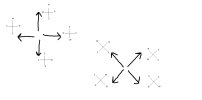Took the first time, got 50 5/5/5.
The math section (the moment you realized you done messed up, after spending 5 minutes calculating by hand and look up to find your answers on the screen, but it's not there.) It is not that difficult, was expecting logs and negative exponents and Xs and Ys but didn't see any. Got kicked out section 6 minutes left, spend a little time on word problems. (80% of my question is word based questions) I will recall some question that I encounter and write it here later.
The last section was hard, the flying simulation got me so confused. Depends on your region, I got an X52 logic tech stick and throttle, where you could buy it online for 150 and return it later after the test.
The recruiter said that I am not able to go for aviation or NFO because of a low score. I think I should at least all 6s, should have read the instruction more carefully on the last section, but not trying to take it again. I will submit my score for the May board for Intel and SWO (GPA 3.6 BA in International Studies) but I heard it is really competitive for Intel. Like some of the previous poster, I am naturalized citizen and speak Chinese, Russian, and Turkic languages. Hope I get picked up by Intel, at this point just trying to get my foot into the door and be useful.
3 hard weeks (12 hours a day )in the library, I had 0 knowledge on most of this stuff, this is been a challenging 3 weeks.
To people who are nervous, please don't. If I can do it, you could too.
Thanks for the practice test and study guide. It helped me a lot.
The math section (the moment you realized you done messed up, after spending 5 minutes calculating by hand and look up to find your answers on the screen, but it's not there.) It is not that difficult, was expecting logs and negative exponents and Xs and Ys but didn't see any. Got kicked out section 6 minutes left, spend a little time on word problems. (80% of my question is word based questions) I will recall some question that I encounter and write it here later.
The last section was hard, the flying simulation got me so confused. Depends on your region, I got an X52 logic tech stick and throttle, where you could buy it online for 150 and return it later after the test.
The recruiter said that I am not able to go for aviation or NFO because of a low score. I think I should at least all 6s, should have read the instruction more carefully on the last section, but not trying to take it again. I will submit my score for the May board for Intel and SWO (GPA 3.6 BA in International Studies) but I heard it is really competitive for Intel. Like some of the previous poster, I am naturalized citizen and speak Chinese, Russian, and Turkic languages. Hope I get picked up by Intel, at this point just trying to get my foot into the door and be useful.
3 hard weeks (12 hours a day )in the library, I had 0 knowledge on most of this stuff, this is been a challenging 3 weeks.
To people who are nervous, please don't. If I can do it, you could too.
Thanks for the practice test and study guide. It helped me a lot.


